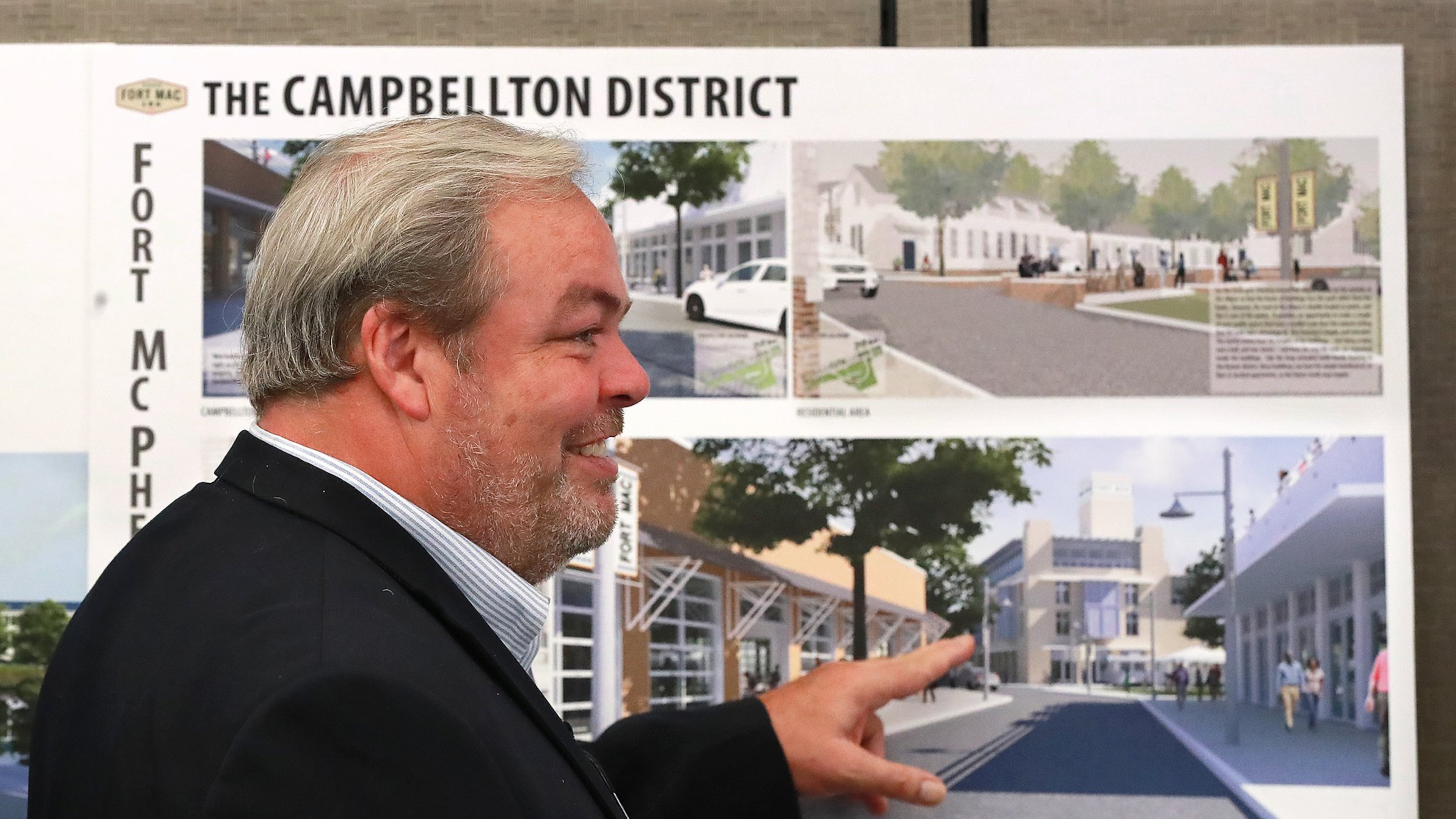Fort McPherson agency to search for new developer

The Fort McPherson redevelopment authority will soon be in search of a new developer.
The board of the McPherson Implementing Local Redevelopment Authority, or Fort Mac LRA, voted Thursday to negotiate a buyout of developer Stephen Macauley, parting ways after two and a half years of planning and negotiations.
It’s unclear how long a search for a new developer might take, much less how long it will be before the 130 acres of remaining Fort Mac land the authority controls is redeveloped. But it will be yet another reboot for a project that’s languished for years.
After the meeting, Fort Mac LRA Chairman Cassius Butts wished Macauley well and said the decision to end the agreement was mutual. He also laid out an ambitious timeline, saying he wanted a new developer who could begin construction next year.
“Ideally, as chairman, I’d like to see 2020 with a shovel in the ground,” Butts said.
Macauley did not attend Thursday’s meeting. When informed of the board vote, he said in a text message, “I am deeply disappointed for everyone.”
Terms of the buyout will be negotiated in the weeks ahead. Interim Executive Director Alan Ferguson said the authority would negotiate to obtain Macauley's master plans and other work product. Under Macauley's agreement, he could be owed millions of dollars for planning work and for fees related to Fort Mac LRA's recent sale of a former command building for a future U.S. Food and Drug Administration lab complex.
Fort Mac closed in 2011, delivering an economic wallop to neighborhoods already ravaged by the foreclosure crisis and the Great Recession. In 2015, Fort Mac LRA acquired the 488-acre site from the Army and sold 330 acres to filmmaker Tyler Perry, who has since developed a sprawling movie studio.
About 145 acres were retained for future development, but the authority has made little progress other than the $17 million sale in August to Easterly Government Properties for the future FDA facility.
Macauley signed his development agreement in May 2017. Under that pact, Macauley and partners would develop about 2,500 residences, offices, shops, lodging, restaurants and a performing arts center under a long-term lease of the land.
But relations between Macauley and the authority grew strained. In February, Macauley and Fort Mac LRA appeared to be on the cusp of a new development deal, but the relationship devolved into allegations by each side that the other was in default.
The allegations contained some racial overtones when Macauley asserted in an email that he’d been told an adviser to Mayor Keisha Lance Bottoms had said Macauley was being “coddled” because he is white.
Fort Mac LRA’s former executive director also expressed doubts about Macauley’s financial wherewithal. Macauley, meanwhile, alleged the agency had strung him along with needless delays and altered deal terms.
Representatives of the city also approached filmmaker Tyler Perry about taking on the project amid tensions with Macauley.
In recent meetings, Macauley urged the board to stick with him. Last month, Macauley brought in David Moody, the leader of one of the region's largest minority-owned construction companies, as a new partner in a bid to salvage a deal.
Ferguson said the board and staff had reservations about the feasibility of Macauley’s plans. Macauley and his partners proposed buying Fort Mac land instead of a long-term lease.
Atlanta City Councilwoman Joyce Sheperd said Fort Mac is in a far better place than when the post closed or even four years ago when Perry bought his land.
“The recession pulled everybody back,” Sheperd said, especially the south side of Atlanta, which took far longer to recover.
Now, Perry’s studio is buzzing with life, the Beltline is under construction nearby and Fort Mac lies in a new and powerful federal incentive area known as an Opportunity Zone, she said.
Fort Mac is now rezoned, and the authority will have Macauley’s master plan and a community study to build upon, Sheperd said.
Ferguson said developers with interest in Opportunity Zone projects call his office every week.
Sheperd suggested Perry could have interest as he has a right of first offer for any Fort Mac LRA land.
But after the Fort Mac LRA board approved the sale of the Force Command building for the FDA lab, Perry and Bottoms blasted the deal. Perry vowed never to do business with the authority again.
The authority also faces a demand by Bottoms' office for nearly $5 million to repay loans the city says are now in default.
“The LRA owes Atlanta taxpayers more than $5 million,” Michael Smith, a Bottoms spokesman, said in an email Thursday. “We trust that as the LRA Board negotiates this buyout, they have accounted for these funds — which are due immediately — to the City.”
Ferguson said the LRA believes it owes $1.5 million plus interest and a check would be sent to the city before the close of business Thursday.



